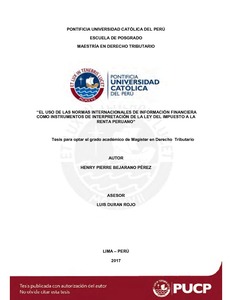| dc.contributor.advisor | Durán Rojo, Luis Alberto | |
| dc.contributor.author | Bejarano Pérez, Henry Pierre | es_ES |
| dc.date.accessioned | 2018-01-15T20:59:10Z | es_ES |
| dc.date.available | 2018-01-15T20:59:10Z | es_ES |
| dc.date.created | 2017 | es_ES |
| dc.date.issued | 2018-01-15 | es_ES |
| dc.identifier.uri | http://hdl.handle.net/20.500.12404/9859 | |
| dc.description.abstract | The thesis analyzes the legality of the use of International Financial Reporting Standards
(IFRS) by SUNAT, the Tax Court and the Judiciary as instruments for interpreting concepts
insufficiently determined in the Income Tax Law. It realizes that both standards have
different purposes and that IFRS do not comply with the constitutional tax parameters.
Despite this, the majority position supports its use in the determination of corporate income
tax.
When analyzing the sources of Tax Law, International Financial Reporting Standards (IFRS)
and its relationship with Peruvian corporate income tax, it is identified that our system of
determination of the corporate income tax is of double balance or independent balance. In
spite, the production of the legal operators evidences problems to considered the accounting
how taxable base of the tax, which corresponds to another system, the single balance. | es_ES |
| dc.description.abstract | En la tesis se analiza la legalidad del uso de las Normas Internacionales de Información
Financiera (NIIF) por parte de la SUNAT, Tribunal Fiscal y el Poder Judicial como
instrumentos de interpretación de conceptos insuficientemente determinados en la Ley del
Impuesto a la Renta. Se da cuenta de que ambas normas tienen finalidades distintas y que
las NIIF no cumplen con los parámetros constitucionales tributarios. Pese a ello, la posición
mayoritaria avala su uso en la determinación del impuesto a la renta empresarial.
Al analizar las fuentes del Derecho Tributario, las Normas Internacionales de Información
Financiera (NIIF) y su relación con impuesto a la renta empresarial peruano, se identifica
que nuestro sistema de determinación del impuesto a la renta empresarial es de doble
balance o balance independientes. Debido a ello, la producción de los operadores jurídicos
evidencia problemas al haber considerado a la contabilidad como base imponible del
impuesto, la cual corresponde a otro sistema, el de balance único. | es_ES |
| dc.language.iso | spa | es_ES |
| dc.publisher | Pontificia Universidad Católica del Perú | es_ES |
| dc.rights | info:eu-repo/semantics/openAccess | es_ES |
| dc.rights.uri | http://creativecommons.org/licenses/by/2.5/pe/ | * |
| dc.subject | Contabilidad--Normas | es_ES |
| dc.subject | Contabilidad financiera | es_ES |
| dc.subject | Impuesto a la renta | es_ES |
| dc.title | El uso de las normas internacionales de información financiera como instrumentos de interpretación de la ley del impuesto a la renta peruano | es_ES |
| dc.type | info:eu-repo/semantics/masterThesis | es_ES |
| thesis.degree.name | Magíster en Derecho Tributario | es_ES |
| thesis.degree.level | Maestría | es_ES |
| thesis.degree.grantor | Pontificia Universidad Católica del Perú. Escuela de Posgrado | es_ES |
| thesis.degree.discipline | Derecho Tributario | es_ES |
| renati.discipline | 422277 | es_ES |
| renati.level | https://purl.org/pe-repo/renati/level#maestro | es_ES |
| renati.type | http://purl.org/pe-repo/renati/type#tesis | es_ES |
| dc.publisher.country | PE | es_ES |
| dc.subject.ocde | https://purl.org/pe-repo/ocde/ford#5.05.01 | es_ES |






